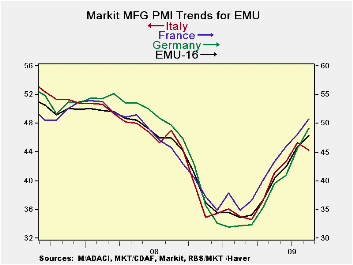 Global| Sep 03 2009
Global| Sep 03 2009Markit MFG PMIs Turn Higher; Gains Are Widespread
Summary
The Markit PMIs turned higher in August. Across the main reporting Markit economics we find MFG PMIs are over the break-even mark of 50 in two of seven EU nations. Three others have readings with a ‘49’ handle. Italy back-slid in [...]

The Markit PMIs turned higher in August. Across the main
reporting Markit economics we find MFG PMIs are over the break-even
mark of 50 in two of seven EU nations. Three others have readings with
a ‘49’ handle. Italy back-slid in August and has the second weakest MFG
reading at 44.24; Ireland’s MFG PMI rose this month but stands at a
weaker level than Italy’s gauge, at 43.98. Still, all the countries in
the table sport PMI readings that reside in the upper 50% of their
range except Italy and Ireland. Country level readings are in the 60th
percentile or better. Greece and France post the highest relative
readings, in the 70th percentile of their respective ranges or better,
For EMU the current reading is 48.24 and that stands in the 60th
percentile, or in the top 40% of its range.
The services readings for August also show widespread
improvement. The jump this month was very large for EMU and the gains
for services spread across all major individually reporting countries
in our six large-country sample.
With both manufacturing and the services sectors are making
strong gains they are boosting the overall EMU composite index which
moved up above the mark of 50, signaling growth. For its part, the OECD
sees an end to the global recession. But it is warning of continued
difficulties and strong head winds. The outlook has improved but the
degree of improvement remains shrouded in caution. No agency is
sticking its neck out to look for strong growth, even though most are
now citing improvement and calls that say the recession is over are
becoming commonplace
| NTC/Markit MFG Indices | |||||||
|---|---|---|---|---|---|---|---|
| Aug-09 | Jul-09 | Jun-09 | 3Mo | 6Mo | 12Mo | Percentile | |
| Euro-13 | 48.24 | 46.25 | 42.62 | 45.70 | 41.43 | 39.34 | 60.9% |
| Germany | 49.17 | 45.65 | 40.88 | 45.23 | 40.51 | 38.81 | 62.5% |
| France | 50.78 | 48.13 | 45.86 | 48.26 | 44.12 | 41.10 | 71.4% |
| Italy | 44.25 | 45.36 | 42.69 | 44.10 | 40.87 | 39.24 | 42.2% |
| Spain | 47.20 | 47.33 | 42.76 | 45.76 | 40.78 | 36.57 | 65.2% |
| Austria | 49.95 | 46.46 | 42.01 | 46.14 | 41.73 | 40.07 | 65.4% |
| Greece | 51.13 | 48.82 | 47.67 | 49.21 | 45.46 | 44.48 | 75.8% |
| Ireland | 43.98 | 43.66 | 42.47 | 43.37 | 40.11 | 39.27 | 48.6% |
| EU | |||||||
| UK | 49.71 | 50.25 | 46.78 | 48.91 | 45.97 | 41.69 | 68.8% |
| percentile is over range since March 2000 | |||||||
Robert Brusca
AuthorMore in Author Profile »Robert A. Brusca is Chief Economist of Fact and Opinion Economics, a consulting firm he founded in Manhattan. He has been an economist on Wall Street for over 25 years. He has visited central banking and large institutional clients in over 30 countries in his career as an economist. Mr. Brusca was a Divisional Research Chief at the Federal Reserve Bank of NY (Chief of the International Financial markets Division), a Fed Watcher at Irving Trust and Chief Economist at Nikko Securities International. He is widely quoted and appears in various media. Mr. Brusca holds an MA and Ph.D. in economics from Michigan State University and a BA in Economics from the University of Michigan. His research pursues his strong interests in non aligned policy economics as well as international economics. FAO Economics’ research targets investors to assist them in making better investment decisions in stocks, bonds and in a variety of international assets. The company does not manage money and has no conflicts in giving economic advice.
More Economy in Brief
 Global| Feb 05 2026
Global| Feb 05 2026Charts of the Week: Balanced Policy, Resilient Data and AI Narratives
by:Andrew Cates






